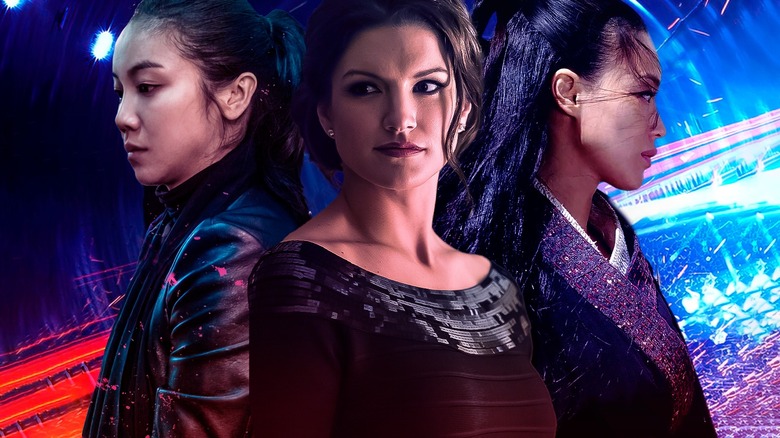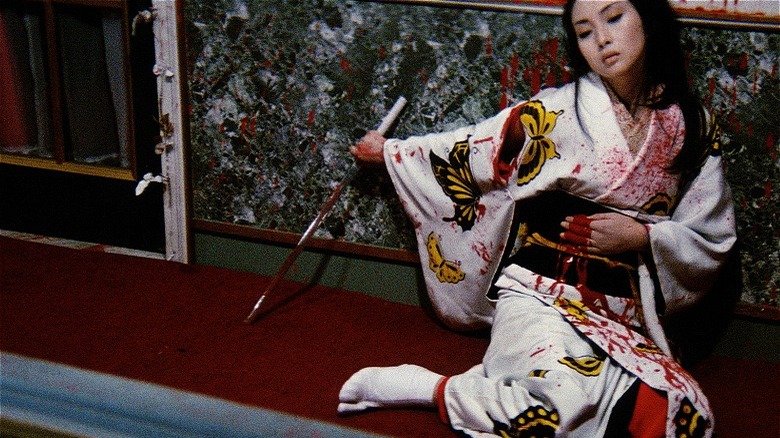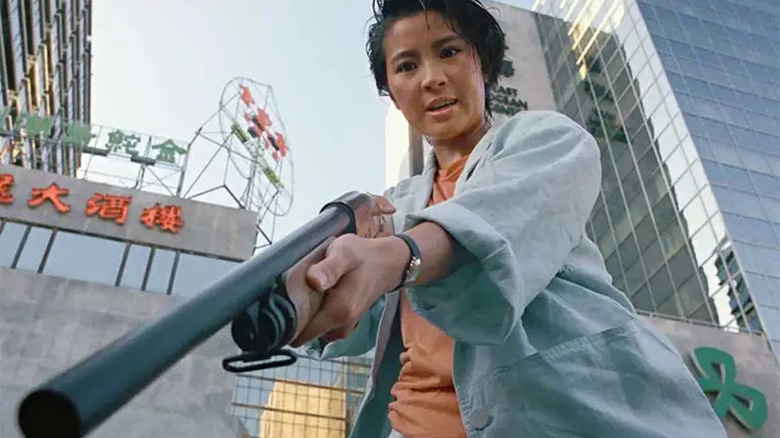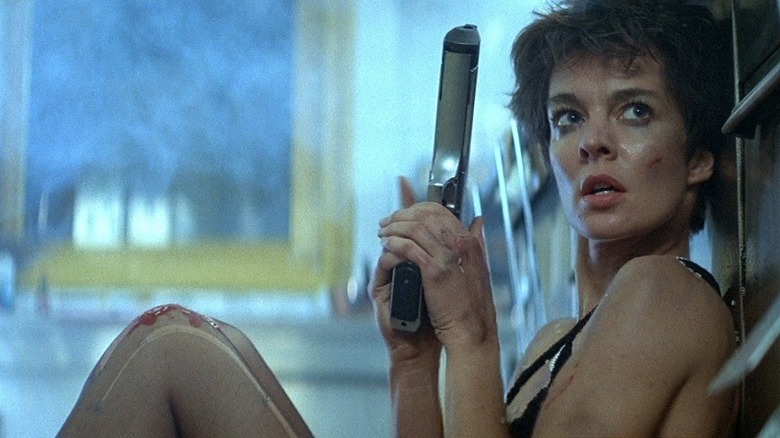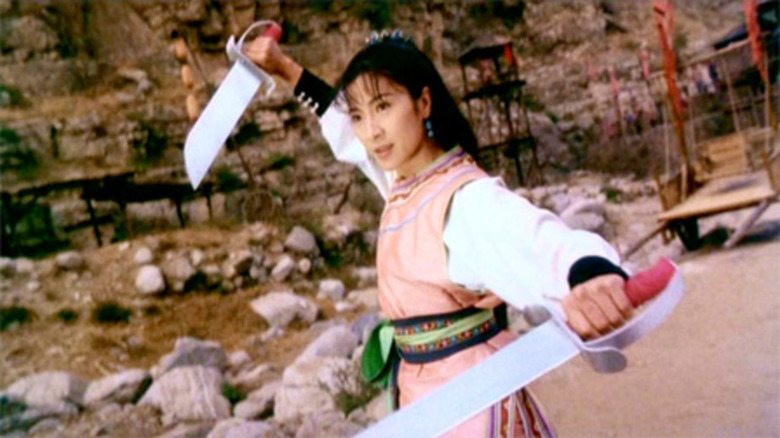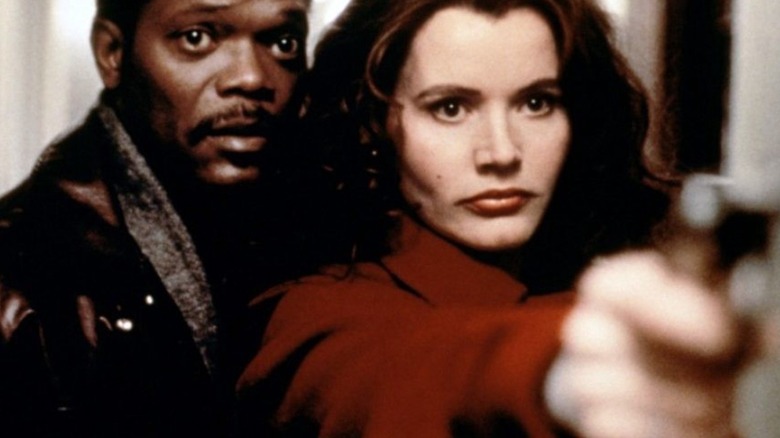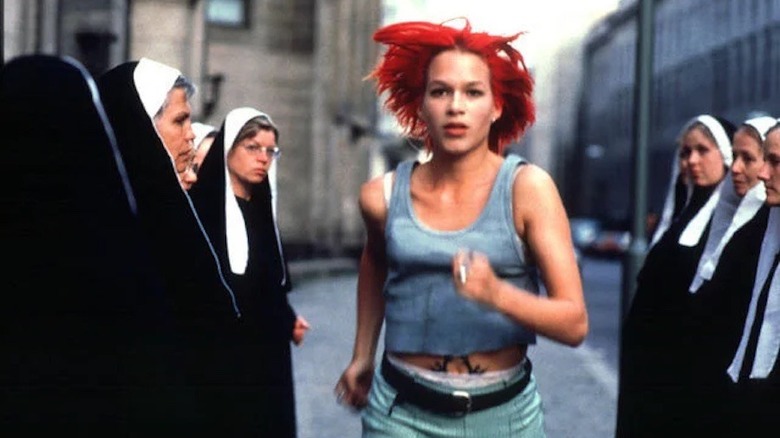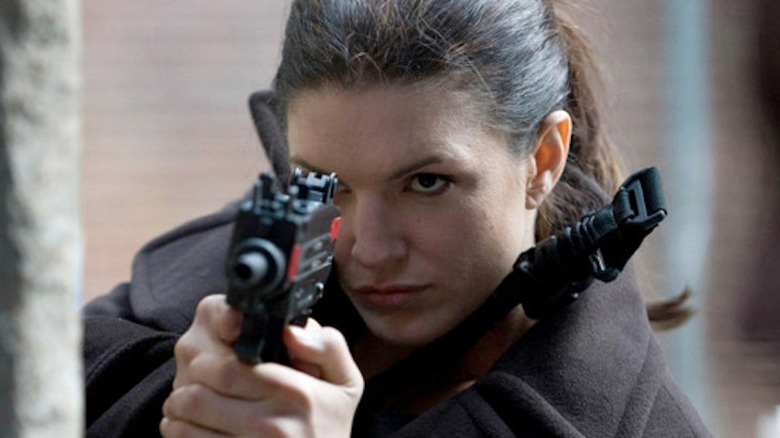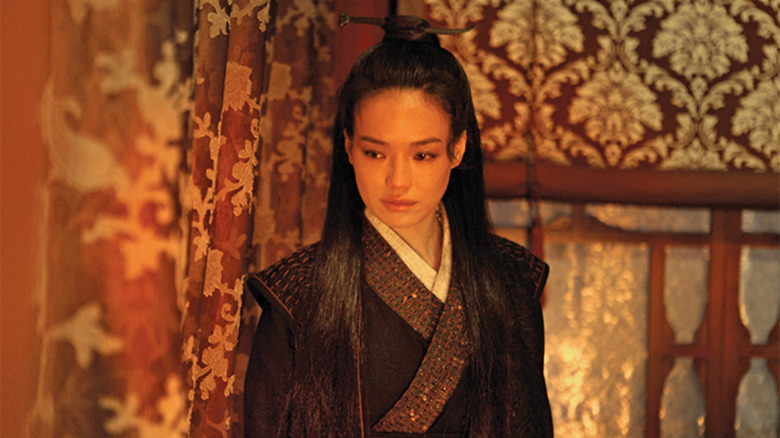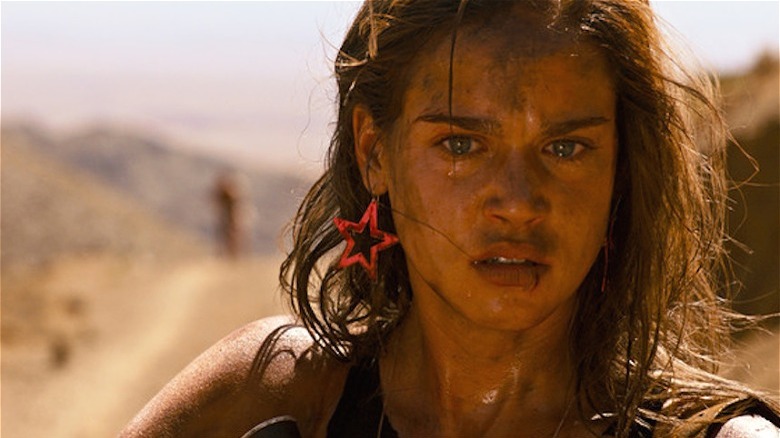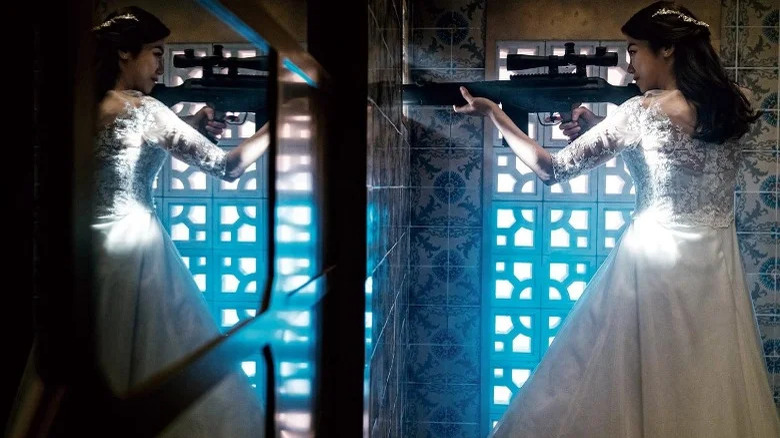10 Underrated Female-Led Action Movies You Need To See
Rousing action films get your blood pumping and lift your spirits. In some respects, they're even more thrilling when women play the action hero. Though ladies have been kicking butt in movies for decades now, it's still just as exciting when a new woman fights her way to the big screen and into our hearts. If you're a fan of action films -– and hopefully if you're a fan of women –- you've probably seen many of this century's most popular female-led action epics. There are the "Kill Bill" films, of course, Ripley's badassery in "Aliens," and more recent fare like "Atomic Blonde" and "Mad Max: Fury Road."
These are all incredible films that certainly deserve their place in the action pantheon, but others deserve our attention, too. For one thing, there actually were a few female-led action films made before the year 2000, something you might not be aware of if you weren't alive to see them. Then there's the fact that countries other than America produced great action epics, many of which go underseen in the English-speaking world. This list could easily be filled with badass women from Hong Kong action films alone.
Variety is the spice of life, they say, so I've filled this list with a diverse supply of women-led action films to quench your righteous thirst.
Lady Snowblood (1973)
"Lady Snowblood," a 1973 Japanese film based on the manga of the same name, ranks as an absolute killer. A classic in the vengeful-women genre, the film follows a young woman named Yuki (Meiko Kaji), who also goes by the name Lady Snowblood. Yuki was born in a woman's prison, where her mother did time for killing one of the four assailants who brutally raped her and killed her husband. Yuki, her mother's vengeance in her blood, began training as an assassin from a young age in order to carry out her familial duty.
Filmed on a relatively low budget, "Lady Snowblood" nonetheless features shocking action sequences and plenty of style. Lady Snowblood's weapon is a sword she hides inside an unassuming umbrella, which means her victims almost never suspect her. Numerous limbs are severed throughout the film and every attack results in a voluminous amount of spraying blood.
For those familiar with his work, it shouldn't come as a surprise that "Lady Snowblood" served as a major inspiration for Quentin Tarantino in the making of the "Kill Bill" movies. The look and sound of the film feel distinct –- if not familiar, considering its influence -– and Lady Snowblood herself, Meiko Kaji, performs the ominous theme song. It's an essential moment in action cinema and can always benefit from more discussion amongst contemporary action fans.
Yes, Madam! (1985)
It'd be a crime to compose a list of the best female-led action films without including any of Michelle Yeoh's many credits, and I'm no criminal. Though younger American moviegoers might have only recently become aware of Yeoh thanks to "Everything Everywhere All At Once," she's an absolute icon of Hong Kong action cinema and has been working steadily since the 1980s. One film that deserves more attention on this side of the world is 1985's "Yes, Madam!," which was a hit in Hong Kong and other parts of Asia but never made a huge impact in America.
Directed by prolific Hong Kong filmmaker Cory Yuen, the story centers on Inspector Ng (Yeoh), who joins forces with Scottish investigator Carrie Morris (Cynthia Rothrock) to retrieve a piece of microfilm mistakenly stolen by a group of thieves. "Yes, Madam!" was Yeoh's first starring role in a feature, and she's a force of nature despite being only 22 years old at the time. It's even more impressive that Yeoh holds her own alongside Rothrock, a veteran martial artist and holder of seven black belts.
The fight scenes are intricately choreographed, and it's a total joy to see Yeoh and Rothrock take down an entire army of bad guys with their kung-fu prowess. It's a shame Rothrock isn't more well-known outside of the industry, as she certainly deserves more recognition for her work both here and in the dozens of other films she's appeared in. Put this one on your list.
La Femme Nikita (1990)
You've probably heard of "La Femme Nikita," but I'd wager a guess that many of you haven't actually seen it. The 1990 film spawned a popular Canadian series in the 1990s as well as an (extremely underrated!) CW series starring Maggie Q, but the original is worth checking out. Directed by Luc Besson, known for films like "Leon: The Professional" and "The Fifth Element," the film stars Anne Parillaud as the title character.
A teenage junkie, Nikita robs a pharmacy one evening, killing a police officer in the process. She is sentenced to life in prison, but the government fakes her death and forces her to become an assassin. After intensive training -– including instruction from a teacher played by French screen legend Jeanne Moreau –- she eventually operates as a skilled killer, a far cry from her days as a listless junkie.
"La Femme Nikita" might not be the deepest of films, but it's great fun, and Besson's distinct style –- often called the "Cinéma du look" -– at the very least pleases the eye. Parillaud impresses in the lead role, and "La Femme Nikita" became one of the era's most influential female-led action films, spawning remakes such as "Black Cat" in Hong Kong and "Point of No Return" in America.
Wing Chun (1994)
Considering her status as an action icon, it's only right that Michelle Yeoh features in two films on this list. The second is "Wing Chun," a 1994 film that boasts plenty of butt-kicking girl power. Yeoh plays the title character, a young woman who masters the art of kung-fu to ward off unwanted suitors. Wing Chun works at her family's tofu shop, and only she can stand up to the village's local bandits.
When a beautiful widow named Charmy (Catherine Hung) arrives in town, predators Flying Monkey (Cui Ya-hui) and Flying Chimpanzee (Norman Chui) try to snatch her up, and Wing Chun comes to the rescue. This leads Wing Chun to face off against the two baddies in a duel, during which she shows off her superior skills and protects the women of the village.
Yeoh amazes as the title character and her fighting talents are off the charts, but the film also spotlights several other formidable women. Wing Chun's relationships with the flirtatious Charmy (Kingdom Yuen), her hilariously biting and greedy aunt, and her wise kung-fu master (Cheng Pei-pei), are just as important as the romance between Wing Chun and her childhood friend (Donnie Yen). There's plenty of goofiness to be found here, but the action sequences are astounding, and these women are not to be trifled with.
The Long Kiss Goodnight (1996)
Not enough people know that Geena Davis and Samuel L. Jackson starred in an action movie together in the 1990s, and I want to rectify that. The film in question is 1996's "The Long Kiss Goodnight." Quite similar in plot to "The Bourne Identity," it casts Davis as Samantha, who leads a quiet life with her young daughter in a Pennsylvania town. Samantha gets in a car crash and suddenly discovers she possesses combat skills she never knew she had and begins experiencing flashbacks from her past.
She hires a private detective, Mitch (Jackson) to help her uncover the truth of who she really is and finds herself at the center of a vast government conspiracy. Davis and Jackson both prove themselves willing to go all-in with the film's madcap action and goofy dialogue. There's no half-assing anything in this total blast of an action flick. Also, in an unexpected turn of events, the film somehow predicts 9/11.
Davis, with her tall stature and can-do attitude, makes a perfect action star, and Jackson is unbeatable as her witty sidekick — a duo we didn't know we needed, but are grateful to have been blessed with nonetheless. Whenever people say "They don't make them like this anymore," I can only hope they're including mid-budget action romps from the 1990s, where the wacky quips are many and the only goal is to have a little fun.
Run Lola Run (1998)
Talk about truth in advertising. "Run Lola Run" is a movie about running. Franka Potente plays Lola, a woman who receives a call from her boyfriend, Manni (Moritz Bleibtreu), informing her that he lost a bag of 100,000 Deutsche marks that he owes to a very bad guy. Lola has 20 minutes to come up with the money or Manni will go ahead with plan B: robbing a bank.
You might wonder how a 20-minute run takes up an entire 80-minute film. Director Tom Tykwer deploys every cinematic technique he can think of to tell the story in a unique way, resulting in a chaotic hour and change. Lola actually makes the run three different times, with tiny variations between each version hugely affecting the outcome. We also get small peeks into the fates of seemingly insignificant secondary characters, their timelines playing out in brief flashes in between all the running.
Then there's the film's style, which is as lawless as its characters. Sometimes, Lola's running becomes so frenzied that the camera can't possibly follow her movements, so a scene will switch to animation. Certain scenes are sped up, others are rewound, and sometimes the frames shift to black and white. You can't fault the film for doing exactly what it set out to do, which is to take running as its energetic subject. If anything, you might feel like you actually endured a good workout, to say nothing of Potente's impressive athletic feats.
Haywire (2011)
By my estimation, Steven Soderbergh is one of the greatest directors working today, but his 2011 film "Haywire" somehow managed to fly under the radar. The film stars former mixed martial arts artist Gina Carano, who at one point had a promising career before her political comments essentially tanked it. It's too bad, because Carano could have been the female action star we'd been waiting for. She plays Mallory Kane, a black ops agent double-crossed by her government and forced to go on the run. Trust no one, shoot first, and talk later, right?
As a physical performer, Carano is incredibly powerful and all of the stunts -– which she handled herself -– look effortless. It's very much a martial arts film rather than a goofy action flick, and Soderbergh wastes no time on extraneous dialogue. That doesn't mean Carano is totally on her own, however, as the film has an unexpectedly stacked supporting cast: Michael Fassbender, Ewan McGregor, Bill Paxton, Antonio Banderas, and Michael Douglas.
The plot, frankly, is irrelevant, but with such great action and so talented a cast, this doesn't matter. "Haywire" is also tightly edited — no surprise there, as Soderbergh always edits his movies himself –- and shot more like an arthouse drama than an action flick at times, giving it a unique look.
The Assassin (2015)
It's not an exaggeration to declare 2015's "The Assassin" one of the most beautifully shot action films of all time. Renowned Taiwanese helmer Hou Hsiao-hsien directed this wuxia adventure, set during China's Tang Dynasty. The titular character, Nie Yinniang (Shu Qi), is a young woman raised as an assassin after being sent away from her family as a child. A failed kill prompts Yinniang's master, Jiaxin (Fang-Yi Sheu), to ship her off on an even tougher assignment: she must eliminate her cousin, Tian Ji'an (Chang Chen), a military governor and the man she was betrothed to as a girl.
Strikingly, "The Assassin" minimizes the action quotient. Yinniang spends much of the time laying in wait, spying on her targets from behind curtains and up in trees while they discuss their circumstances. Thus, the film moves at quite a languid pace, though when the fighting does commence, these sequences are as visually arresting as the moments of quiet observation.
Every frame in "The Assassin" is perfectly composed. Much of the film was shot in Inner Mongolia, and the landscapes captured therein are breathtaking. The movie is filled with lush wide shots as well as intimate interior shots, the latter of which are sometimes veiled by wispy curtains that hide Yinniang's unceasing presence. Shot on 35mm, the rich colors are strikingly crisp and each frame feels almost delicate. To non-Chinese audiences, the plot might be somewhat difficult to follow, but that kind of visual elegance needs no translation.
Revenge (2017)
The rape-revenge film has courted controversy since it first burst into the horror genre in the 1970s. The reasons for this are abundant. For one thing, men pioneered the genre, and these films –- such as "I Spit on Your Grave" -– seem to take perverse pleasure in the woman's brutalization before her inevitable revenge. Coralie Fargeat's sharp and provocative debut, "Revenge," keeps this history in mind and creates something new, what one might call a feminist take on the subject.
We set our sights on Jen, (Matilda Lutz), a young woman vacationing in the desert with her married boyfriend, Richard (Kevin Janssens). Richard's friends arrive early and ruin their romantic getaway, and one guy rapes Jen while the other watches. Richard wants Jen to forget about the incident but she refuses, running into the desert as the three men give chase. What follows is a brutal story of survival and transformation.
Unlike past films of this sort, the perspective of Fargeat's cinematic tale is made explicit. The rape itself is not sexualized and instead implicates the viewer in the voyeuristic spectacle. Film critic Mary Beth McAndrews calls the look of the film the "transformational gaze," as it compels the viewer to shift how they think about the protagonist while she reinvents herself both physically and mentally. It's certainly not for the faint of heart -– much of Jen's transformation involves her brutalized body –- but it's a thrilling take on exploitation and what lies beyond female objectification.
The Villainess (2017)
"The Villainess" forces the viewer into an adrenaline rush. Consider the film's opening sequence. A young woman enters a building and quickly kills dozens of assailants in a hallway. Around every corner, more men await, but she defeats them all. She steps into another room only to be met by a dozen more men, ready to fight. They're all dead in minutes. The first several moments are filmed POV-style, so we only see this woman's hands as she loads and unloads her gun. The camera switches to a wider angle when the woman smashes against a mirror, and we finally glimpse her small yet formidable figure.
The young woman in question is Sook-hee (Kim Ok-vin), a trained assassin. The brutal cold open recalls the famous fight scene in "Oldboy," only even longer and more deadly. Unfortunately, after Sook-hee's incredible victory, she's captured by an organization that wants to turn her into an assassin — again. The ensuing narrative echoes the story of "La Femme Nikita," though with several even more violent twists and turns.
I won't go too much into the plot, but suffice it to say the action is jaw-dropping. From the opening sequence, which I've already outlined, to the final fight which involves Sook-hee attaching herself to a moving bus using an ax, there's very little time to catch one's breath. And when there isn't any fighting going on, there are plot developments as demented as they are heartbreaking. Survival is a bloody, devastating business.
